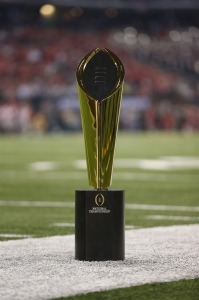Is Winning the Only Criteria of Greatness?
 The first National college football championship to be decided on the gridiron was recently completed in Jerry Jones’ AT&T Stadium this week. In a great game—unless you are an Oregon Duck fan—Ohio State prevailed in the new four team tournament. The competing teams were selected by an impartial committee seeking to identify the four best teams in America.
The first National college football championship to be decided on the gridiron was recently completed in Jerry Jones’ AT&T Stadium this week. In a great game—unless you are an Oregon Duck fan—Ohio State prevailed in the new four team tournament. The competing teams were selected by an impartial committee seeking to identify the four best teams in America.
For decades, football fans have clamored for a playoff system that allows the best teams at the end of the year to go head-to-head with a single winner emerging to take the title. Prior to this year, fans of multiple schools could claim that distinction of being the best in America, especially since many of the top teams did not play against each other. As a consequence, fans of multiple schools could spend the off-season, claiming to be #1 with no evidence to dispute their claim. I suspect that many fans will grow to regret the new system with a single clear-cut winner. Whether fans of a team like TCU—which was not selected to participate in the tournament—or a member of the Alabama Tide, the old system provided for a number of different champions —different bowls and different polls—and gave multiple schools bragging rights to the mythical title. As a fan, I think I would rather have the old system than the new.
Biologists and sociologists say that competition is the natural order of living things, from basic cells to complex biological entities like humans. Winning when competing for resources such as water, food, mates, and prestige can be the difference in survival. In the real world, competition can lead to complete annihilation and extinction of rivals. Competition is usually the process by which limited resources are allocated—winners reap the rewards and losers pay the price.
As a businessman, I like competition. With reasonable protection against discrimination and exploitation, striving to be the best, the biggest, and baddest can benefit everyone. At the same time, rivalry can have negative results including deaths, injuries, and damaged psyches. In business, extreme competition is usually accompanied by high stress, long work hours, abusive working relationships, and abominable working conditions. That is why rules are important to manage the behavior of competitors, as well as the relationships and activities within the rival firms. I want to beat my competitors in the marketplace, not destroy their companies or employees.
In my view, not every activity is or should be competitive. Do I need to be the best guitar player to enjoy music? Do I need to win some mythical championship to experience the pleasure of a game like baseball, football, or other sports? Do I need a trophy to justify every activity or effort? The rational answer is, “Of course, I don’t.”
It seems that competition provides greatest benefits when individuals compete against themselves, not their associates or rivals. Golf—a sport I’ve played for thirty years—is a good example of how competition can be managed to produce the most useful result. My neighbor, blessed with great hand-eye coordination and the beneficiary of years of childhood gold lessons, is a scratch golfer while I struggle to break 100. Nevertheless, we enjoy playing together, and we root for another on the course; I hope he breaks par, and he hopes I’ve brought enough golf balls to finish the round. While his score is always lower than mine, we enjoy our outings, and each of us strives to be better than we began the day. The fact that his score is lower than mine does not diminish my enjoyment of the game, the effort I put into practice or playing, or my score.
Whether running a business or living a life, balance and perspective are extremely important. Winning at all costs is rarely, if ever justified, whether in business or play. A wise person prioritizes goals in light of his specific abilities and deficiencies, and focuses on his outcome, not how he might compare with someone else. Remember that an alternative to competition is cooperation, a much more difficult relationship to establish and maintain, but immeasurably more satisfying to the individuals involved and likely to produce superior results.
Randy Lewis's Blog
- Randy Lewis's profile
- 2 followers



